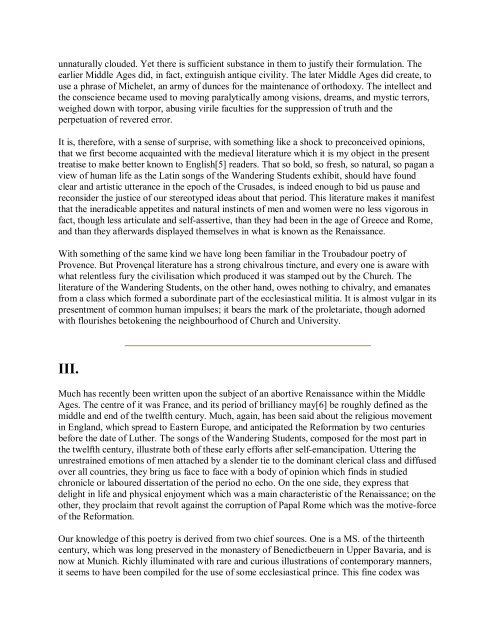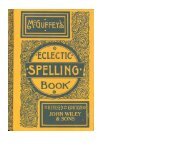WINE, WOMEN, AND SONG. - The Language Realm
WINE, WOMEN, AND SONG. - The Language Realm
WINE, WOMEN, AND SONG. - The Language Realm
You also want an ePaper? Increase the reach of your titles
YUMPU automatically turns print PDFs into web optimized ePapers that Google loves.
unnaturally clouded. Yet there is sufficient substance in them to justify their formulation. <strong>The</strong><br />
earlier Middle Ages did, in fact, extinguish antique civility. <strong>The</strong> later Middle Ages did create, to<br />
use a phrase of Michelet, an army of dunces for the maintenance of orthodoxy. <strong>The</strong> intellect and<br />
the conscience became used to moving paralytically among visions, dreams, and mystic terrors,<br />
weighed down with torpor, abusing virile faculties for the suppression of truth and the<br />
perpetuation of revered error.<br />
It is, therefore, with a sense of surprise, with something like a shock to preconceived opinions,<br />
that we first become acquainted with the medieval literature which it is my object in the present<br />
treatise to make better known to English[5] readers. That so bold, so fresh, so natural, so pagan a<br />
view of human life as the Latin songs of the Wandering Students exhibit, should have found<br />
clear and artistic utterance in the epoch of the Crusades, is indeed enough to bid us pause and<br />
reconsider the justice of our stereotyped ideas about that period. This literature makes it manifest<br />
that the ineradicable appetites and natural instincts of men and women were no less vigorous in<br />
fact, though less articulate and selfassertive, than they had been in the age of Greece and Rome,<br />
and than they afterwards displayed themselves in what is known as the Renaissance.<br />
With something of the same kind we have long been familiar in the Troubadour poetry of<br />
Provence. But Provençal literature has a strong chivalrous tincture, and every one is aware with<br />
what relentless fury the civilisation which produced it was stamped out by the Church. <strong>The</strong><br />
literature of the Wandering Students, on the other hand, owes nothing to chivalry, and emanates<br />
from a class which formed a subordinate part of the ecclesiastical militia. It is almost vulgar in its<br />
presentment of common human impulses; it bears the mark of the proletariate, though adorned<br />
with flourishes betokening the neighbourhood of Church and University.<br />
III.<br />
Much has recently been written upon the subject of an abortive Renaissance within the Middle<br />
Ages. <strong>The</strong> centre of it was France, and its period of brilliancy may[6] be roughly defined as the<br />
middle and end of the twelfth century. Much, again, has been said about the religious movement<br />
in England, which spread to Eastern Europe, and anticipated the Reformation by two centuries<br />
before the date of Luther. <strong>The</strong> songs of the Wandering Students, composed for the most part in<br />
the twelfth century, illustrate both of these early efforts after selfemancipation. Uttering the<br />
unrestrained emotions of men attached by a slender tie to the dominant clerical class and diffused<br />
over all countries, they bring us face to face with a body of opinion which finds in studied<br />
chronicle or laboured dissertation of the period no echo. On the one side, they express that<br />
delight in life and physical enjoyment which was a main characteristic of the Renaissance; on the<br />
other, they proclaim that revolt against the corruption of Papal Rome which was the motiveforce<br />
of the Reformation.<br />
Our knowledge of this poetry is derived from two chief sources. One is a MS. of the thirteenth<br />
century, which was long preserved in the monastery of Benedictbeuern in Upper Bavaria, and is<br />
now at Munich. Richly illuminated with rare and curious illustrations of contemporary manners,<br />
it seems to have been compiled for the use of some ecclesiastical prince. This fine codex was



